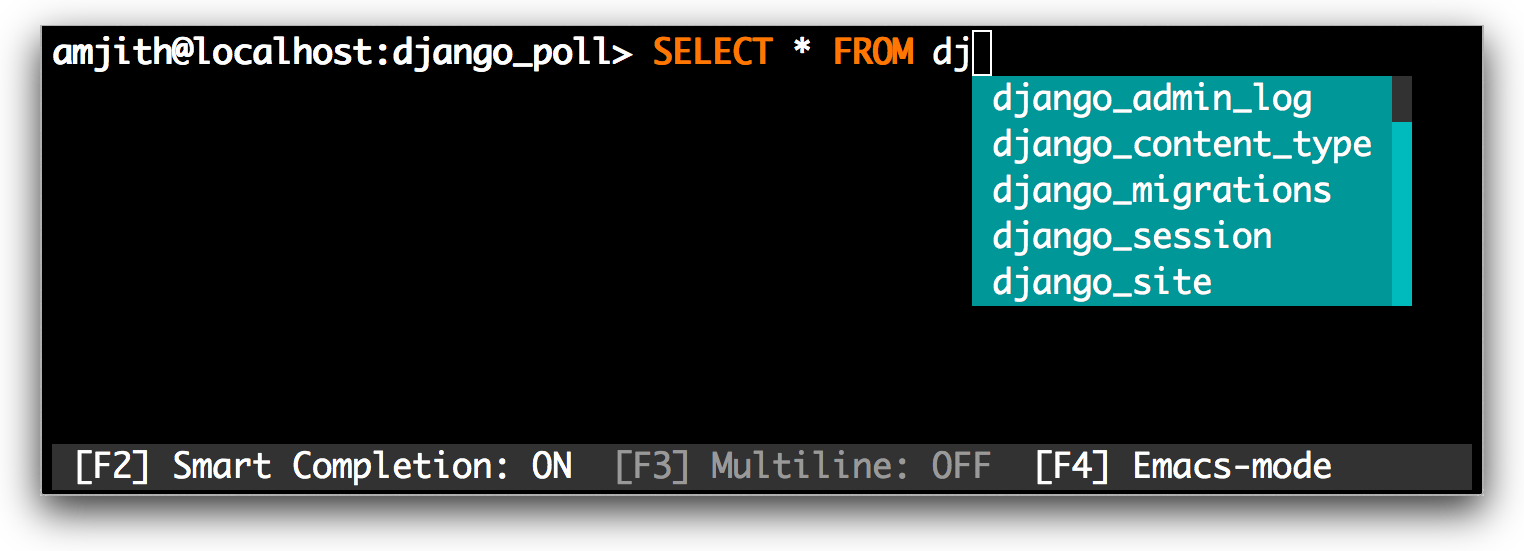A command line client for MySQL that can do auto-completion and syntax highlighting.
HomePage: http://mycli.net
Postgres Equivalent: http://pgcli.com
If you already know how to install python packages, then you can install it via pip:
You might need sudo on linux.
$ pip install -U mycli
or
$ brew update && brew install mycli # Only on OS X
or
$ sudo apt-get install mycli # Only on debian or ubuntu
$ mycli --help
Usage: mycli [OPTIONS] [DATABASE]
Options:
-h, --host TEXT Host address of the database.
-P, --port TEXT Port number to use for connection. Honors
$MYSQL_TCP_PORT
-u, --user TEXT User name to connect to the database.
-S, --socket TEXT The socket file to use for connection.
-p, --password Force password prompt.
--pass TEXT Password to connect to the database
--ssl-ca PATH CA file in PEM format
--ssl-capath TEXT CA directory
--ssl-cert PATH X509 cert in PEM format
--ssl-key PATH X509 key in PEM format
--ssl-cipher TEXT SSL cipher to use
--ssl-verify-server-cert Verify server's "Common Name" in its cert
against hostname used when connecting. This
option is disabled by default
-v, --version Version of mycli.
-D, --database TEXT Database to use.
-R, --prompt TEXT Prompt format (Default: "\t \u@\h:\d> ")
-l, --logfile FILENAME Log every query and its results to a file.
--defaults-group-suffix TEXT Read config group with the specified suffix.
--defaults-file PATH Only read default options from the given file
--auto-vertical-output Automatically switch to vertical output mode
if the result is wider than the terminal
width.
-t, --table Display batch output in table format.
--warn / --no-warn Warn before running a destructive query.
--local-infile BOOLEAN Enable/disable LOAD DATA LOCAL INFILE.
--login-path TEXT Read this path from the login file.
--help Show this message and exit.
$ mycli local_database
$ mycli -h localhost -u root app_db
$ mycli mysql://amjith@localhost:3306/django_poll
mycli is written using prompt_toolkit.
- Auto-completion as you type for SQL keywords as well as tables, views and columns in the database.
- Syntax highlighting using Pygments.
- Smart-completion (enabled by default) will suggest context-sensitive completion.
SELECT * FROM <tab>will only show table names.SELECT * FROM users WHERE <tab>will only show column names.
- Support for multiline queries.
- Favorite queries. Save a query using
\fs alias queryand execute it with\f aliaswhenever you need. - Timing of sql statments and table rendering.
- Config file is automatically created at
~/.myclircat first launch. - Log every query and its results to a file (disabled by default).
- Pretty prints tabular data.
- Support for SSL connections
If you're interested in contributing to this project, first of all I would like to extend my heartfelt gratitude. I've written a small doc to describe how to get this running in a development setup.
https://github.com/dbcli/mycli/blob/master/DEVELOP.rst
Please feel free to reach out to me if you need help.
My email: amjith.r@gmail.com
Twitter: @amjithr
I haven't built an RPM package for mycli yet. So please use pip to install mycli. You can install pip on your system using:
$ sudo yum install python-pip
Once that is installed, you can install mycli as follows:
$ sudo pip install mycli
This project was funded through kickstarter. My thanks to the backers who supported the project.
A special thanks to Jonathan Slenders for creating Python Prompt Toolkit, which is quite literally the backbone library, that made this app possible. Jonathan has also provided valuable feedback and support during the development of this app.
Click is used for command line option parsing and printing error messages.
Thanks to PyMysql for a pure python adapter to MySQL database.
Tabulate library is used for pretty printing the output of tables.
Tests have been run on OS X and Linux.
THIS HAS NOT BEEN TESTED IN WINDOWS, but the libraries used in this app are Windows compatible. This means it should work without any modifications. If you're unable to run it on Windows, please file a bug. I will try my best to fix it.
As described here, " we only read the [client] section of my.cnf not the [mysql] section".
So, if you want to use a pager, your .my.cnf file should looks like this:
[mysql]
pager = mypager
[client]
pager = mypager
instead of just this :
[mysql]
pager = mypager


